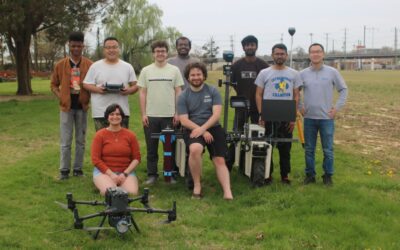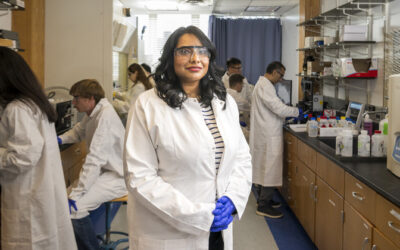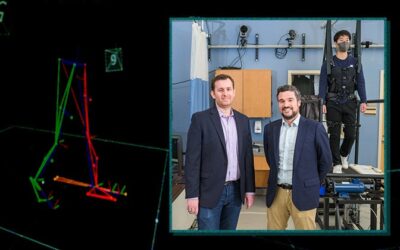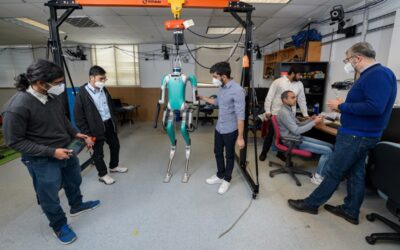Master of Science in Robotics (MSR)
Robotics is an interdisciplinary field that requires crossing the boundaries of traditional engineering disciplines. In the face of the rising expenditures on robotics, there will be a continuing and increasing need for skilled interdisciplinary engineers to design, build, and program robots in the future. This interdisciplinary Master of Science in Robotics (MSR) program answers the societal, government, and industry need for specialized education in this field.
The Master’s in Robotics program consists of 30 credit hours of graduate-level coursework. Choose from a Master’s thesis track or a course-based only track. The curriculum consists of a group of Foundational Courses in four (4) Thematic Areas, and a group of Technical Elective Courses. The latter are selected from an approved list of graduate courses. A student pursuing the Thesis option can request to count 6 credits of Master’s Thesis towards the Technical Electives credits.
Students interested in our full-time campus experience can complete all degree requirements below, including the optional thesis, in as little as 18 to 24 months. See admission requirements and application information below.
![COE-MEEG-Bipedal_Robot-040422 A team of UD engineers working on robots have been awarded about $800,000 from NSF’s Major Research Instrumentation Program to develop a data-based approach to improving two-legged robots’ ability to walk on changing terrains. Mechanical Engineering Professors Ioannis Poulakakis, Panos Artemiadis, Paul Huang and Bert Tanner are leading the project, which has begun with the purchase of a 1.5-meter-tall robot. [UDaily]<br />
Working with the robot are: Prem Chand (jacket / blue shirt), Ioannis Poulakakis (blue sweater), Dhruv Ashwinkumar Thanki (grey pullover), Kunal Sanjay Narkhede (white button down shirt), Aditya Shreyas, (blue gingham shirt), Abhijeet Kulkarni (grey sweater)](https://me.udel.edu/wp-content/uploads/2025/03/COE-MEEG-Bipedal_Robot-040422-042.jpg)
Contact us for more information
Email: msr-info@udel.edu
Phone: 302-831-2423
Click here to apply today
Degree Requirements
The program builds on some of the unique strengths, resources, and expertise that can be identified across the University of Delaware campus, to offer a higher education and professional training opportunity that cannot be easily replicated.
The student is required to complete at least one course from at least three (3) out of the four (4) thematic areas of the Foundational Courses listed below. More than 1 course from each Thematic Area or the area of the student’s primary interest are strongly encouraged and Foundational Courses beyond the required three (3) will count as technical electives.
“My graduate studies at UD gave me adequate knowledge to kick off my first job in building self-driving cars, and laid a good foundation for my later career.”
– Caili Li, UD alumni 2017, Software Engineer at Zoox
“Because of your guidance and the internship opportunity in the MSR program I could land in such a great industry position.”
– Yash Evalekar, UD alumni 2022, Robotics Engineer at EDDA Technology, Inc.
Foundational Courses
The list of Foundational Courses and Thematic Areas is shown below:
1. Robot Analysis & Design
MEEG 671 Introduction to Robotics
MEEG 675 Mechatronics
BMEG 641 Biomechatronics
2. Control
MEEG 621 Linear Systems
MEEG 829 Applied Nonlinear Control
MEEG 894 Linear Feedback Control Design
3. Artificial Intelligence
CISC 681 Artificial Intelligence
CISC 684 Introduction to Machine Learning
CISC 849 Advanced Topics in Computer Applications: COMPUTER VISION
4. Perception
MEEG 677 Introduction to State Estimation
MEEG 877 Sensing and Estimation in Robotics
CISC 642 Introduction to Computer Vision
Technical Electives
CISC 621 Algorithm Design and Analysis
MAST 632 Environmental Field Robotics
MEEG 620 Intermediate Dynamics
MEEG 698 Stochastic Optimal Control
MEEG 890 Nonlinear Programming
MEEG 895 Game Theory & Mechanism Design
MEEG 667 Soft Robots: Design, Principles and Applications
CIEG 675 Matlab for Engineering Analysis
MEEG 667 Introduction to Optimization
MEEG 690 Intermediate Engineering Mathematics
CISC 849 Advanced Topics in Computer Applications: ETHICAL ISSUES: ROBOTICS & AI
MEEG 867 Hybrid Dynamic Systems
CPEG 655 High-Performance Computing With Commodity Hardware
MEEG 667 Digital Control
CPEG 652 Principles of Parallel Computer Architecture
MEEG 867 Microrobotics
MATH 637 Mathematical Techniques in Data Science
CISC 817 Large Scale Machine Learning
CISC 849 Advanced Topics in Computer Applications
CISC 889 Advanced Topics in Artificial Intelligence: TRUSTWORTHY AI
CISC 889 Advanced Topics in Artificial Intelligence: ADVANCED DEEP LEARNING
MEEG 866 Bioinspired Design
MEEG 867 Seminar Bioinspired Engineering Design
MEEG 667 Digital Technology for Agriculture and Natural Resources
MEEG 666 Independent Study
MEEG 666 Independent Study can substitute for up to six (6) graduate elective credits along a non-thesis degree track. Independent study activities can take place outside the campus, in the context of semester-long internships with approved industry or government partners, but always under the supervision and oversight of a faculty member from the participating academic units, who will be ultimately responsible for assigning a grade for the course. The independent study MEEG 666 is usually done on a basis of 3 credits/semester (14-week semester), for up to 6 total credits. A typical workload of a 3-credit course in a 14-week semester is 9 hours/week, and for a 7-week semester (e.g. summer) is 18 hours/week.
The student should work with the faculty advisor to complete the following syllabus form and submit it to the program for approval before enrolling to MEEG 666 Independent Study.
Thesis Option
A student pursuing the Thesis option can request to count six (6) credits of Master’s Thesis towards the required course credits.
See official program policy statement for details. For more information about this program, contact msr-info@udel.edu
Admission Requirements
The requirements for admission to the MSR program are the following:
- A baccalaureate degree in mechanical engineering or in a closely allied field of science or mathematics. Applicants with degrees in other disciplines may be admitted with provisional status and may be required to complete prerequisite courses that are deemed necessary for appropriate preparation for courses in the program.
- An undergraduate grade point average in engineering, science and mathematics courses of at least 3.0 on a 4.0 scale.
- International applicants: The TOEFL with a minimum of 100 on the IBT and a speaking score of 20. IELTS with a minimum score of 6.5 with no individual sub-score below 6.0 on the IELTS alternative.
- Three letters of recommendation from former teachers or supervisors.
- Resume
- Statement of Purpose
All items should be uploaded into your graduate application. Admission is selective and competitive based on the number of well qualified applicants and the research opportunities available with the faculty. Meeting the stated minimum academic requirements does not guarantee admission.
Mechanical Engineering/Robotics 4+1:
The Bachelor of Mechanical Engineering/Robotics (MS) is for highly-qualified undergraduate students already enrolled in the BME degree program. This program allows the student to earn both the BME and the MSR degree in 5 years of full-time study in Mechanical Engineering at the University of Delaware. Students should apply in the spring of their junior year.
Requirements:
- Students will complete all the required credits for the BME.
- Students will take two 600-level technical electives as part of the requirements for the BME degree. These courses are to be chosen from the course requirements for the MEM and will also count towards their MSR degree requirements.
- Students will complete an additional 24 credits of coursework to meet the course requirements for the MSR degree
- Students must achieve a 3.0 GPA (B average) in their graduate work to earn the MSR.
Biomedical Engineering/Robotics 4+1 (BBE/MS):
The 4+1 BBE/MSR degree program is offered to highly-qualified undergraduate students already enrolled in the BBE degree program. This program allows the student to earn both the BBE and the MSR degree in 5 years of full-time study in Biomedical Engineering at the University of Delaware. Students should apply in the spring of their junior year.
Requirements:
- Students first complete all the required credits for the BBE.
- Students take two 600-level technical electives as part of the requirements for the BBE degree. These courses are to be chosen from the course requirements for the MSR degree and will also count towards their 4 + 1 degree requirements.
- Students complete an additional 24 credits of coursework to meet the course requirements for the MSR degree
- Students must achieve a 3.0 Grade Point Average (GPA) (a B average) in their graduate work to earn the 4 + 1 degree.
Application Deadlines
MSR Fall Admission
- January 31: Priority consideration for admission
- July 31: Final deadline to apply
MSR Spring Admission
- October 31: Priority consideration for admission
- December 31: Final deadline to apply
Tuition rates of all programs can be seen on the Graduate College Tuition webpage.
Program Core Faculty





Christopher Rasmussen
Associate Professor
Computer Vision
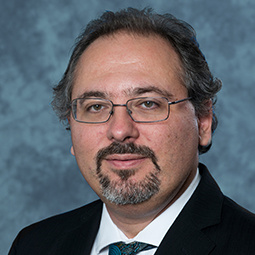
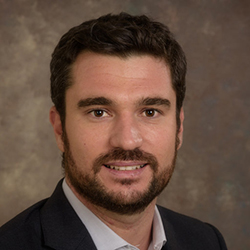



Affiliated Faculty

Gonzalo Arce
Professor

Stephan Bohacek
Associate Professor

Charles Boncelet
Professor

Austin Brockmeier
Assistant Professor
Research Lab

Leonard Cimini
Professor



Chandra Kambhamettu
Professor
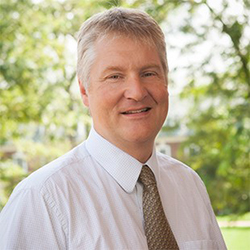
Mark Moline
Professor

Xi Peng
Assistant Professor
Deep Learning; Computer Vision

Thomas Powers
Associate Professor
Ethics
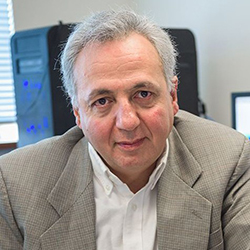
Valery Roy
Associate Professor
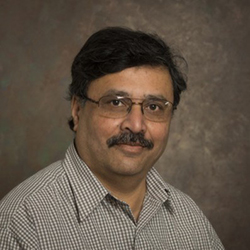
Vijay Shanker
Professor

Chien-Chung Shen
Professor
Networks
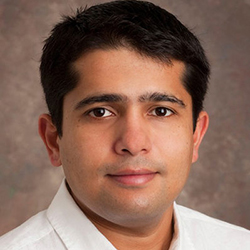
Abhyudai Singh
Associate Professor
Systems/Synthetic Biology; Stochastic Hybrid Systems
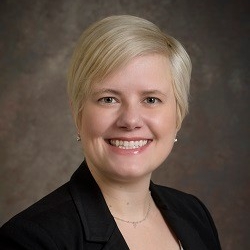
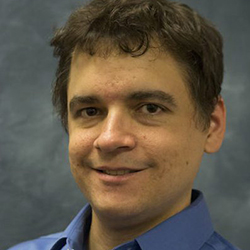
Adam Wickenheiser
Associate Professor

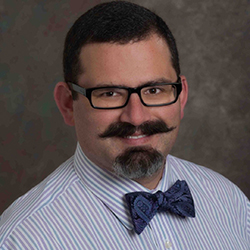
Research Labs and Facilities
Students will have the ability to work in state-of-the-art research labs and facilities that are unique in the University of Delaware. Students will be exposed to implementation challenges of turning theory and algorithms into a functional system that is robust enough to be deployed and be functional under real-world conditions. In fact, one of the unique aspects of the MSR program in UD is in leveraging the campus-wide facilities, expertise, and existing faculty collaborations, to expose its students within the normal curriculum, to aspects of implementation and utilization of robotic systems in air, land, and sea.
Areas of Research Interest Include:
- HRI
- Rehabilitation
- Wireless Networks
- Signal Processing
- Machine Learning
- Signal Processing
- Neural Engineering
- Networks
- Nano/Micro Robotics
- Biorobotics
- Multi-agent Systems
- Rehabilitation
- Estimation Machine Vision
- SLAM
- Vision
- Decentralized Control
- Marine Science
- Deep Learning
- Computer Vision
- Legged Robots
- Nonlinear Control
- Ethics
- Computer Vision
- Micromechatronics
- Rehabilitation
- Machine Learning
- Networks
- Systems/Synthetic Biology
- Stochastic Hybrid Systems
- Field-based Robotics
- Biomechanics
- Multi-robot Systems
- Human-robot Interaction
- Oceanography
- Energy
- Environment
- Plant Science
- Quantitative Genetics
- Mathematical Modeling
- Brain machine interfaces
- Swarm robotics
- Human-Swarm Interaction
“I felt confident coming out of UD that I could succeed in industry, academia, or a research lab. The ability to dive deeper into interesting and challenging topics through research and tailored classes allowed me to grow as an engineer and as a researcher.”
– Ryan Montgomery, UD alumni 2018, Software Engineer at Capital One
“The newly designed Graduate Student Industry Partnership (GSIP) program allows MS students to work directly for the industry with help of mentors from UD. This is a great opportunity to gain working experience while you are still in college.”
– Lavanya Jakka , UD alumni 2018, AirGreen Inc.
Recent Robotics Highlights
University of Delaware wins impact award at 2025 Farm Robotics Challenge
A team of University of Delaware students won a prize in a competition to design a technological solution to tackle agricultural challenges farmers face.
May is National Inventors Month
Meet Sambeeta Das, a member of UD’s growing innovation ecosystem
Robot-Assisted Therapeutic Engineering
UD engineers are studying how robotic devices can guide personalized rehabilitation strategies for stroke patients.
Programming Agility
UD engineers aim to give robots a leg up.

